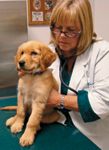Golden retriever study confronts heartbreak of cancer with unparalleled veterinary research effort
Recognizing a large hole in this area of veterinary medical knowledge, Morris Animal Foundation has pioneered the largest study of its kind-and given hope to veterinarians and pet owners alike.
"I need to make an appointment to euthanize my golden," says the hesitant voice on the other end of the phone line. "Lymphoma."
I express my condolences, the same way I did earlier in the day to the family of the golden with melanoma and the one last week with osteosarcoma. My sympathy is genuine. I have lost retrievers of my own to each one of these diseases. As a veterinarian working in a home hospice practice, I see the grim canine cancer statistics played out every day in goodbyes and tears.

Dr. David Haworth, CEO of Morris Animal Foundation, with his own golden retriever, Bridger, a participant in the Golden Retriever Lifetime Study. Haworth hopes this cancer study will improve the health of all dogs. (PHOTOS COURTESY OF MORRIS ANIMAL FOUNDATION)
"Why does this have to happen?" pet owners ask, and while I can say, "Genetics, probably," with some degree of confidence, no one knows exactly why certain breeds are more predisposed than others to neoplasia. We know even less about the influence of outside factors such as nutrition and environment. Given that cancer is the leading cause of death in dogs older than 2, our lack of understanding surrounding this disease process represents a large hole in our veterinary medical knowledge base.
What's missing from our database?
Enter the Morris Animal Foundation, a nonprofit that has invested more than $70 million in veterinary research since its inception in 1948. Although it has about 240 studies it's funded going on at any given time, there's one that stands out. This latest project is unlike anything Morris has taken on before, according to Morris President and CEO David Haworth, DVM, PhD.

Haylee, a 10-week-old golden retriever, is examined by Dr. Julie McCormick for eligibility into the study.
In 2009, at a meeting of veterinary oncologists, the question was asked: What's missing from our database? The answer, said the oncologists, was just too big to take on. "They said, there's this really big thing but nobody can do it, so Morris asked, why don't you give us a try?" recalls Haworth. After more than three years of intense planning, the Golden Retriever Lifetime Study was born.
While this has never been done in veterinary medicine, there is a precedent that has been set in human medicine: The Framingham Heart Study, which has been running continuously since 1948. "The Framingham study," Haworth says, "is the longest running longitudinal study in human medicine. It's now in its third generation, and there have been 2,400 publications out of it." The goal of the Golden Retriever Lifetime Study is similar: to create a comprehensive database of 3,000 purebred golden retrievers during the course of their lifetime.
The depth of detail covered in the study is ambitious. "We know 66 percent of those currently enrolled get their primary water from the municipal water supplies," Haworth says, and most of that obtained from one particular bowl per dog. "The U.S. Geological Survey has data on all heavy water contamination, and we can overlay this. That tells you the level of detail we're looking for."
A lifelong commitment
Haworth concedes that participation in the study is a big commitment. Once a potential participant is found to fit the inclusion criteria of being under 2 years of age and in possession of a three-generation pedigree, both the dog owner and the veterinarian must commit to the entire study process.
Veterinarians will perform annual exams for the life of the pet and collect blood, urine, hair, feces and nail clippings in designated containers at each of those visits. They may also be asked to collect samples at other visits associated with illness or injury, particularly in evaluation of any masses or suspected cancers. The client is responsible for all costs associated with these visits, but Morris does provide $75 a year to help offset those costs.
Although the study was initially conceived by veterinary oncologists, it is hoped the data will give insight into many diseases, from hypothyroidism and heart failure to renal disease and epilepsy. "Our study is set up to find risk factors for cancer in goldens, but I really believe it will have a strong impact on common diseases in all breeds of dogs," says Haworth.
A chance to help
Veterinarians receive no compensation other than their usual charges for the visits, but Haworth hopes the potential to participate in such an expansive study will inspire veterinarians to sign up and recruit their eligible clients.
Stephanie Riner Ensley, DVM, a practitioner at Sugar Creek Animal Hospital in Bentonville, Ark., is one such veterinarian. "I see so many goldens with cancer—too many, really," she says. "Here is a chance to provide data for a lifelong observational study." Ensley has enrolled three goldens to date, with four more owners considering it.
As someone actively recruiting clients to participate, Ensley has seen firsthand what works and what doesn't work when it comes to convincing pet owners to sign up. "One of the greatest concerns owners express is that they are afraid someone will experiment with the dog," she says. "They are much more receptive when we discuss the meaning of 'observational' in the study. I tell them that nobody will dictate how they raise their dog—just be willing to share that information."
Both veterinarians and pet owners also complete a comprehensive questionnaire, covering many aspects of a pet's routine activities. "It's a long one," says Haworth with a laugh, "but the veterinarian one is a little shorter." As both a veterinarian and a golden owner with a pet enrolled in the study, he would know.
"I do think the first round is a little intimidating," says Ensley, but she is quick to add she does not view that as a deterrent. "It really amounts to a physical exam with a few little extras, like the height of the dog. I expect this to become more time consuming as our patients age, but we will be more and more familiar with the data collection forms online, so I do not anticipate a problem or 'time sink' there." She also has a sample collection process worked out in her clinic to keep that aspect of the exam running as smoothly as possible.
Benefits for all breeds and generations to come
Both Ensley and Haworth are excited about the possibilities this study has for improvements in health for all dogs. "One of the criticisms we receive is how applicable these results can be," Haworth says. "But a golden retriever is a pretty good model for dogs. Let's not fool ourselves that cancer is limited to golden retrievers."
Ensley agrees. "I love the thought that this body of data has the potential to help all breeds," she says. "My granddaughter wants to be a 'pet doctor.' I hope she will ultimately be able to offer more evidence-based advice to pet owners based on the findings from the data collected."
Since enrollment began in August 2012, about 1,100 of the 3,000 total dogs needed have signed on. "One of the things we are focusing on right now is recruitment," says Haworth, noting that although enrollment has been a bit slower than anticipated, the retention has exceeded expectations. Morris has put the word out about the study in traditional press, through breed clubs and—with great success, Haworth notes—veterinarians.
"We believe this is the biggest study in veterinary medicine to date," Haworth says. "We've had a great response from breed clubs, who are interested in healthy goldens, and the veterinarians are interested in what it can do for the field." The study team is counting on the enthusiasm of veterinarians like Ensley to actively solicit participation from clients.
"I do encourage other veterinarians to participate in the study," says Ensley. "I think this is a chance to think beyond our practice and look at the potential impact for dog generations beyond the ones we are seeing now—to be a part of something bigger than our little community of pet owners." She even hands out information about the study to golden owners she sees while out and about and tells them to talk to their veterinarian. "Sadly, a few have talked to the veterinarian they use and they are not interested," she says.
That aside, Ensley is heartened by comments she has heard from owners of dogs other than goldens. She says the most common comment she hears is, "when are they going to do this study for (whichever breed they own)?
"Every little bit helps get the word out," Ensley says. "Cancer touches people's hearts."
Including our own—as both veterinarians and dog lovers. Tomorrow, I am euthanizing a dog with metastasized hemangiosarcoma. "I haven't told the children yet," says the owner with a sigh. "I'm not sure how to explain this to them." Perhaps, one day, we won't have to.
For more information about the Morris Animal Foundation's Golden Retriever Lifetime Study, visit caninelifetimehealth.org.
Dr. Jessica Vogelsang, known as Dr. V. among her readers, is a regular contributing author for a number of well-known publications. Read more from her award-winning blog at pawcurious.com.